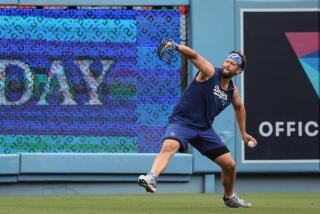The Wright Attitude
The dark cloud that has followed Cleveland Indian pitcher Jaret Wright the last two seasons reappeared suddenly this spring, reminding him once again that nothing comes easily.
Wright had just tossed his 60th and final warmup pitch before an exhibition last month against Detroit in Florida. He was about to test his surgically repaired right shoulder, throwing against major league batters for the first time in 10 months.
“This storm came out of nowhere,” Wright said. “It rained for 25 minutes, just enough to bump my start. Then the sun came out and they played the game.”
It’s enough to make a guy paranoid.
“Maybe something is out to get me,” Wright said, laughing.
These are the speed bumps he encounters while trying to jump-start his career.
One day, Wright is starting the seventh game of the World Series. The next thing he knows, he is starting over. Things have changed that fast since 1997, when Wright advanced from phenom at double-A Akron to phenomenal in the postseason for the Indians. But his label changed from prospect to suspect just as quickly.
There are silver linings, though. The shoulder problems have allowed Wright to get back on track without the hoopla and expectations.
Wright, the 10th player selected in the 1994 draft, remained in Winter Haven, building up his stamina, after the Indians broke camp. The Indians hope to have him back in their rotation no later than June 1.
“We rushed Jaret to the big leagues,” said Mark Shapiro, Cleveland’s assistant general manager. “We asked him to do the hardest thing, to develop as a pitcher against major league hitters. His quick success made that even harder.
“It has taken time for him to develop and grow. What we are left with today is a very mature, focused, driven individual. When he gets on the other side of this injury, that’s what Jaret is going to be.”
*
The Indians could use Wright. Injuries have left their rotation a little thin. The Indians, who used 32 pitchers last season, began the season with two rookies as starters.
But team officials were committed to moving Wright along at a tortoise’s pace after he missed two spring starts because of rainouts. After two years of shoulder problems, there was no reason to hurry his rehabilitation.
“I told him he is going to be pitching in the major leagues for 10 years, so why jeopardize that to get back in a month?” said his father, Clyde Wright, a former pitcher for the Angels.
Jaret Wright has pitched well against minor league competition in Winter Haven. His fastball has been clocked at 94 mph and he has begun to gear up his pitching for major league hitters. In a recent start, Wright’s last 10 pitches were changeups.
“I asked him after the game if there was something wrong with his arm,” Indian scout Tom Giordano told the Cleveland Plain Dealer. “Jaret said, ‘I’ve got plenty left in my fastball tank, but they said when I go out on rehab, they want the full package ready to go.’ ”
The package will be ready for delivery after Wright makes two or three more starts in Winter Haven and a few starts in the minor leagues. Indian officials expect him back in the rotation between May 15 and June 1.
“There is no benefit for us or Jaret to rush him,” Shapiro said. “It will be better if he has foundation and confidence underneath him when he moves on to pitch at the major league level.”
In other words, the Indians won’t make the same mistake twice.
*
Wright’s laugh came through loud and clear over the telephone. “You don’t need me to answer that question,” he said when asked to pinpoint the high point of his career so far.
“I told Jaret the closest I ever got to a World Series was the second day of spring training,” said his father, who had a 100-111 record in 10 major league seasons, eight with the Angels.
Jaret Wright, his stomach churning, took the mound and stood on the mountaintop when he faced the Florida Marlins in October 1997. At 21, he was the second-youngest pitcher to start a World Series game, behind only Kansas City’s Bret Saberhagen.
Wright went 6 1/3 innings, allowing one run and striking out seven. The Indians lost, 3-2, in 11 innings. But Wright was the series’ darling, going 1-0 with a 2.92 earned-run average in two starts.
That capped a pinch-me-I-must-be-dreaming rookie season. Three years earlier, he had been a senior at Katella High. He began 1997 with double-A Akron, moved on to triple-A Buffalo, and was thrust into the Indian rotation on June 24.
There was more than a little return-of-the-conquering-hero atmosphere at Anaheim Stadium that August, when Wright went seven innings to beat the Angels. Clyde beamed in a seat behind Cleveland’s dugout.
Wright finished 8-3 in 16 starts. He then beat the Yankees twice in the American League Divisional Series.
“It was like everything was moving a million miles an hour that season,” Wright said.
His tumble was fast too. Wright was 12-10 in 1998. The next year, he was 8-10 with a 6.06 ERA and went on the disabled list twice with shoulder troubles.
He also served a five-game suspension in 1999 for his part in a brawl during a game against Boston. It started after he hit Darren Lewis with a pitch. Wright received a fine from the league after another brawl, this time between the Indians and Detroit.
Wright was now on the hot seat, with the American League and the team.
League President Gene Budig summoned him for a meeting, which was less a heart-to-heart chat than a public statement to other players. After the season, Indian General Manager John Hart told Wright he needed to get in better shape, that the Indians wanted a better return for their investment.
“Over the last couple years, he has matured quite a bit,” Clyde Wright said. “He knows what is going on in the big leagues and knows what it takes to stay there.”
Good health, for starters.
*
Wright picked up a baseball last December for the first time in five months. He was just going to play a little catch.
“It didn’t feel too good,” Wright said. “It was kind of discouraging. I knew it was going to be a long road, from that first time I pick up a ball until I was ready to throw in a major league game. Still, there was a light at the end of the tunnel, even if it seemed pretty far away.”
Wright showed up in terrific shape last spring. And he started the season fast, winning his first two starts, then took a no-hitter into the seventh inning against Seattle on April 26, though he didn’t receive a decision.
By May, however, the pain was too much. He did two tours on the disabled list and tried to solve the problem through rehabilitation. Finally, on Aug. 17, he underwent shoulder surgery.
“I tried everything humanly possible to avoid surgery,” Wright said. “At the end of the day, it wasn’t going to get any better. It was hurt. Something was torn in there.”
The surgery, in a way, allowed Wright to rediscover his career, out of the spotlight. There was less pressure being damaged goods than being a hot commodity.
Instead of talking about unfulfilled potential, the media considered him a long-term project.
“When you’re a No. 1 pick, people expect you to be No. 1,” Clyde Wright said. “He doesn’t have to think about being a No. 1 pick anymore. He is a big league baseball player.”
Jaret Wright says others’ expectations didn’t affect him.
“Actually, the mental part has been one of my strong suits,” he said. “I haven’t let anything absolutely crush me. You’re going to have real hard times. You just keep things in perspective.”
Wright is not about to let anyone rain on his parade.
More to Read
Go beyond the scoreboard
Get the latest on L.A.'s teams in the daily Sports Report newsletter.
You may occasionally receive promotional content from the Los Angeles Times.











